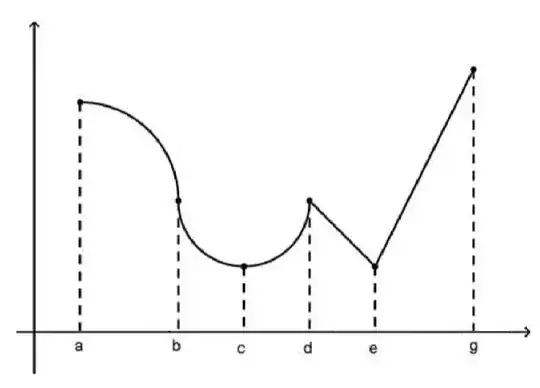The reader is asked to identify the function's critical values. Point $x=c$ is a critical value because $f'(c)=0$. Also, points $x=b,d,e$ are critical values because $f'$ is undefined at those points.
Since critical values include points where $f'$ is undefined, would the endpoints $x=a$ and $x=g$ be included? If $f'(a)$ and $f'(g)$ are undefined, then they are considered critical values by definition.
According to this question and this question and this question, a function is still continuous at the endpoints of its domain, which would imply that
(1.) $$\lim_{x \to a^-} f(x) = \lim_{x \to a^+} f(x)$$
(2.) $$\lim_{x \to g^-} f(x) = \lim_{x \to g^+} f(x).$$
Continuity is a pre-requisite for differentiability, but not sufficient for differentiability, so we have to be careful. Would it also be correct that
(3.) $$\lim_{x \to a^-} \frac{f(x)-f(a)}{x-a} = \lim_{x \to a^+} \frac{f(x)-f(a)}{x-a}$$
(4.) $$\lim_{x \to g^-} \frac{f(x)-f(g)}{x-g} = \lim_{x \to g^+} \frac{f(x)-f(g)}{x-g}?$$
I don't see why it would be fair to say (1.) and (2.) are true but not (3.) and (4.).
If $f$ is not differentiable at $x=a$ and $x=g$, then these points should be called critical values, since the definition of critical values are points where $f'$ is zero or undefined. This would be advantageous! Careful students looking for local extrema will remember to check endpoints if they are technically considered critical values.
What is the official answer according to real analysis? Thanks for your thoughts!
